As it became known to Kommersant, Yamalshelf, owned by ex-Minister of Energy Igor Yusufov, who is trying to obtain a license for the East Tasi site in Yamal, potentially suitable for exporting LNG, has encountered difficulties. The company has been striving to obtain a license on a declarative basis since 2021, but after agreeing with the ministries, it turned out that the site overlaps with the boundaries of a specially protected natural area (SPNA). Back in winter, Yamalshelf adjusted the requested boundaries and in February asked the government to issue a license, taking into account the adjustments, but the Ministry of Natural Resources sent an application for a new round of approvals.
The Yamal Shelf Company (“Yamalshelf”) of Igor Yusufov is asking the government to grant it a license for the Vostochno-Tasiysky subsoil block within “adjusted boundaries”. The corresponding letter dated February 2 (Kommersant has a copy) was sent by Yamalshelf CEO Amir Galimov to Deputy Prime Minister Victoria Abramchenko (in charge of subsoil use). According to Kommersant, Mrs. Abramchenko on March 9 instructed the Ministry of Natural Resources and Rosnedra to consider the appeal. The secretariat of the Deputy Prime Minister “Kommersant” confirmed this.
The East Tasiysky block is located in the Gulf of Ob and borders on the Tasiysky block, which is part of Gazprom’s Tambey gas cluster. Novatek’s license areas are also located nearby, the gas of which the company plans to use mainly for liquefaction. Last week, the government approved amendments to the legislation that allow free export of LNG from sites located north of the 67th parallel, East Tasi is one of them.
Yamalshelf wants to obtain a license for the Vostochno-Tasiya block on a declarative basis, which is valid for blocks in inland waters and the territorial sea (12 miles from the coast), the procedure for obtaining such blocks was approved in 2020.
At the same time, the structures of Igor Yusufov were one of the initiators of the idea of licensing such plots and were the first to receive plots in the Ob and Baidaratskaya bays according to the declarative principle (see Kommersant dated June 21, 2022). Applications are accepted in two windows: in December-January and June-July.
The February letter from the head of Yamalshelf indicates that at the beginning of June 2021, the company sent an application to Rosnedra for a license for the Vostochno-Tasiysky block, which was eventually approved by the relevant ministries. However, the application did not receive government approval. Amir Galimov explains that “the application was accompanied by the coordinates of the corner points of the site in the SK-42 coordinate system, which do not affect the existing specially protected natural areas.” The law prohibits exploration in protected areas, control over this is entrusted to the Ministry of Natural Resources. However, when transferred to the new GSK-2011 coordinate system, it turned out that one of the points enters the protected areas, the letter says.
As a result, Yamalshelf had to prepare a second application with clarification of the boundaries of the site so that they do not overlap with the protected areas. As Kommersant reported, the company sent a new application in the past winter window. In the letter, Yamalshelf reports that the company has clarified the boundaries of the site, retreating from the protected area by more than 2 km, and the site area has decreased by less than 8%, which will not affect its geological prospects.
Nevertheless, Yamalshelf will have to go through a new round of approvals for its application for the Vostochno-Tasisky block.
“A new application from the Rosnedra company was sent to the interested federal authorities, after receiving all the approvals, the draft decision will be sent to the Ministry of Natural Resources for submission to the government,” the Ministry of Natural Resources told Kommersant. LUKOIL has already encountered a similar situation regarding the presence of protected areas, trying to obtain a license for the Nadezhda site in the Baltic. The government did not accept the company’s application, as a result, LUKOIL sent it again in the winter (see Kommersant of January 16).
Since 2021, the SK-42 geodetic coordinate system, introduced back in 1946, is no longer applicable, explains Evgeny Zharov, managing partner of Zharov Group. When carrying out geodetic and cartographic work in the field of subsoil use, the geodetic coordinate system of 2011 (GSK-2011) is used, which is installed and distributed using the state geodetic network, he says. According to him, prior to the introduction of GSK-2011, the performers of geodetic works, having carried out satellite geodetic measurements, were forced to distort the data obtained, switching to the state coordinate system SK-95 (or even more so to SK-42), as a result, the accuracy of the information decreased.









